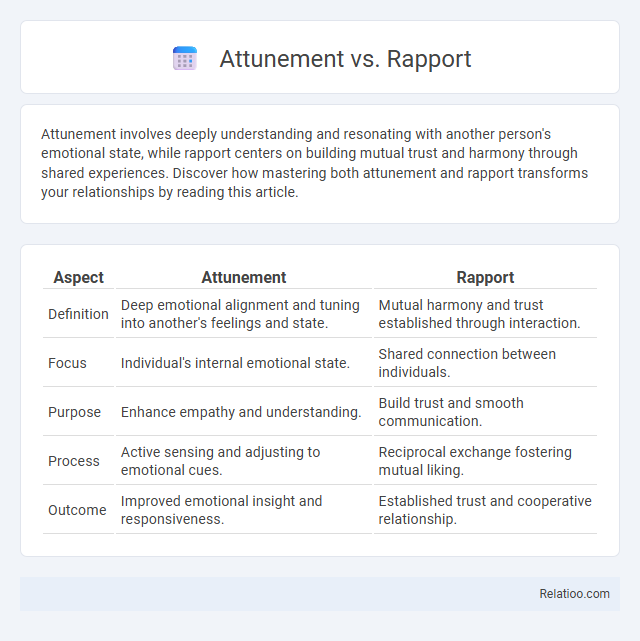Attunement involves deeply understanding and resonating with another person's emotional state, while rapport centers on building mutual trust and harmony through shared experiences. Discover how mastering both attunement and rapport transforms your relationships by reading this article.
Table of Comparison
| Aspect | Attunement | Rapport |
|---|---|---|
| Definition | Deep emotional alignment and tuning into another's feelings and state. | Mutual harmony and trust established through interaction. |
| Focus | Individual's internal emotional state. | Shared connection between individuals. |
| Purpose | Enhance empathy and understanding. | Build trust and smooth communication. |
| Process | Active sensing and adjusting to emotional cues. | Reciprocal exchange fostering mutual liking. |
| Outcome | Improved emotional insight and responsiveness. | Established trust and cooperative relationship. |
Understanding Attunement: A Deep Connection
Understanding attunement involves recognizing and responding to another person's emotional state with empathy and sensitivity, creating a deep, implicit connection. Unlike rapport, which is built on mutual liking and smooth interaction, attunement requires a nuanced perception of subtle cues and emotional undercurrents. Your ability to attune effectively fosters trust and emotional safety, enhancing relational depth beyond mere surface-level harmony.
Defining Rapport: Building Trust and Harmony
Rapport is the foundation of building trust and harmony in any relationship, characterized by mutual understanding and emotional connection. It involves both verbal and nonverbal communication that creates a sense of comfort and cooperation, essential for effective interpersonal interactions. Your ability to establish rapport influences collaboration, conflict resolution, and overall relationship quality.
Key Differences Between Attunement and Rapport
Attunement involves a deep, empathetic connection where one person genuinely understands and resonates with another's emotions and needs, fostering emotional harmony. Rapport centers on building mutual trust and smooth communication, often through shared interests, body language, and positive interactions that create comfort and cooperation. The key difference lies in attunement's emphasis on emotional synchrony and sensitivity, whereas rapport focuses on establishing trust and ease in social interactions.
The Psychology Behind Attunement
The psychology behind attunement reveals its essential role in emotional regulation and relationship building by fostering deep understanding and empathy between individuals. Attunement differs from rapport by emphasizing nonverbal cues and emotional resonance rather than just mutual liking or agreement. Neuroscientific studies indicate that attuned interactions activate mirror neurons, enhancing social bonding and psychological wellbeing.
How Rapport Influences Communication
Rapport creates a foundation of trust and mutual understanding that enhances the quality of communication by making interactions more open and empathetic. When you establish strong rapport, nonverbal cues, tone, and body language align, facilitating smoother and more effective exchanges. This emotional connection helps reduce misunderstandings and promotes collaborative problem-solving in personal and professional settings.
Attunement in Relationships: Emotional Resonance
Attunement in relationships refers to the deep emotional resonance achieved when partners accurately perceive and respond to each other's feelings, creating a harmonious connection. Unlike rapport, which emphasizes mutual trust and ease in communication, attunement involves a continuous, dynamic sensitivity to emotional states that fosters empathy and validation. This emotional synchronization enhances intimacy and strengthens relational bonds by allowing partners to feel genuinely understood and supported.
Building Lasting Rapport: Practical Strategies
Building lasting rapport involves deep attunement to your conversation partner's verbal cues, emotions, and body language, creating a genuine connection. Your ability to attune to subtle signals fosters trust and empathy, which are essential for sustaining meaningful interactions over time. Practical strategies include active listening, mirroring behavior naturally, and validating feelings to reinforce your mutual understanding and strengthen rapport.
Attunement vs Rapport in Leadership and Teams
Attunement in leadership involves deeply understanding your team members' emotions and perspectives to foster connection and trust, while rapport emphasizes building mutual liking and smooth communication. Your ability to attune enhances emotional intelligence and responsiveness, leading to stronger collaboration and conflict resolution within teams. Prioritizing attunement over mere rapport drives authentic engagement and sustained team performance.
Benefits of Balancing Attunement and Rapport
Balancing attunement and rapport enhances communication by fostering deeper emotional connection and mutual understanding, which improves collaboration and trust. Attunement allows individuals to be sensitive to others' emotions and needs, while rapport builds a comfortable and positive relational foundation. Together, they create a dynamic synergy that promotes effective interpersonal interactions and strengthens relationships in both personal and professional settings.
Choosing the Right Approach: When to Use Attunement or Rapport
Attunement involves deeply sensing and responding to another person's emotional state, making it ideal in therapeutic or intimate settings where empathy and emotional connection are crucial. Rapport focuses on building mutual trust and ease through communication and shared interests, which is effective in professional networking or initial social interactions. Choosing between attunement and rapport depends on whether the goal is emotional resonance or creating a comfortable, cooperative environment.

Infographic: Attunement vs Rapport
 relatioo.com
relatioo.com